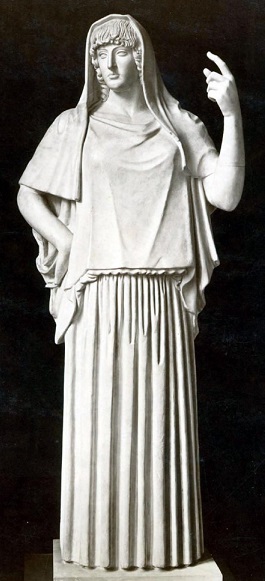Hestia
virgin goddess of the hearth, the domestic affairs and home
Hestia was the virgin goddess of the hearth, the domestic affairs and home. She was also known as the goddess of sacrificial flame and was honoured with receiving first offering at every sacrifice in household.
When Greeks were colonising and making new settlements, there was a costum to take the flame from Hestia's public hearth in the mother city and carry it to a new founded city.
Nowadays, it is known as the Olympic torch which is to be held and carried at the Olympic games ceremony. It is not allowed to burn out, just like it wasn`t in Ancient Greece. The flame of Hestia was tended constantly and never to let it die.
It was believed that, if the flame had extinguished, it would bring cold and barren existence.
Appearance in the works of art
Most of the time, she is depicted as a modest woman wearing modest, but elegant clothing and holding a flower branch. She is also depicted holding a sacrificial flame in her hand.
Making her own way of living
Hestia was the first and "the last" daughter of Cronus and Rhea. She was definitely the first-born of the couple, but was also the first eaten by Cronus and the last disgorged. Therefore, she was named the eldest and the youngest child of the first Olympians. Hestia grew in grace and beauty and followed the path of her nature.
During her time, she was courted in vain by her brother Poseidon and her nephew Apollo. Instead, she pledged herself to eternal virginity and her way, with Zeus to be her witness.
Unlike Athena or Artemis, who were also bound to virginity, she didn't need quests and was simply fulfilled just to exist and serve her family and community. Zeus was happy with her decision and offered her a place on Mount Olympus as a housekeeper.
Like in her nature, Hestia always stayed at home, never left, while other gods and goddesses were on adventures across the world. She was exceptional goddess, light-hearted, non-judgemental and forgiving. It was her habit to offer strangers a shelter and protection when needed.
Altar of Hestia in every city
Because she didn`t leave her home much, she had no desire to become the patron of any city. Instead, she placed the sanctuary in every to protect those who are in need of help. This sanctuary was in open-air public place and with no roof.
This altar soon became a sacred place to her followers. In the centre of the sanctuary, also called a hearth, sacrificial flame was established and people gathered around it. The hearth-fire had great meaning for the social, political and above all, religious life of the ancient Greeks.
The extinction of fire, even by accident, represented a failure of domestic and religious care for the family. Sometimes, the sacrificial flame was deliberately extinguished in rituals and ceremonies of purification and renewal.
But then again it was lit up and represented a new beginning. The centre or heart of the sanctuary was also the place, where food was prepared and meals eaten. Part of the meal was thrown in the fire as ceremonial offering to the goddess.
Hestia's sacrificial animal was domestic pig.
[1]
Facts about Hestia
Hestia was the eldest daughter of Cronos and Rhea.
As with the rest of his children, Cronos ate her but eventually regurgitated her.
She was a sibling to Demeter, Hades, Poseidon, Hera, and Zeus.
She was primarily known the Goddess of the Hearth.
Of all the gods and goddesses, she was considered the gentlest and mildest. Others, critically, have called her colorless because there is little information provided in regard to her character.
Although Hestia appeared in a few stories, she was not overly significant in Greek mythology.
Hestia is completely omitted from the works of Homer, author of the Iliad and the Odyssey.
Poets such as Apollodorous, Hesiod, and Ovid allude to her in their works.
New colonies took fire from the hearth in the prytaneion (also known as the town hall) and kept the fires going in those new locations.
Every meal began and ended with an offering to Hestia.
Like Athena and Artemis, Hestia was referred to as a virgin goddess.
Domestic life was her dominion in spite of her desire to remain a virgin.
Her name literally means "hearth"; appropriately, her priorities were family and community.
Children were accepted into the family by being presented at Hestia’s hearth. This observed first step ensured the goddess’s blessing on the new addition.
Vesta was the Roman equivalent to Hestia.
Public and private worship of Hestia was widespread.
She represented communal security and personal happiness.
Because Hestia remained a virgin, it follows that she had no children.
[2]













